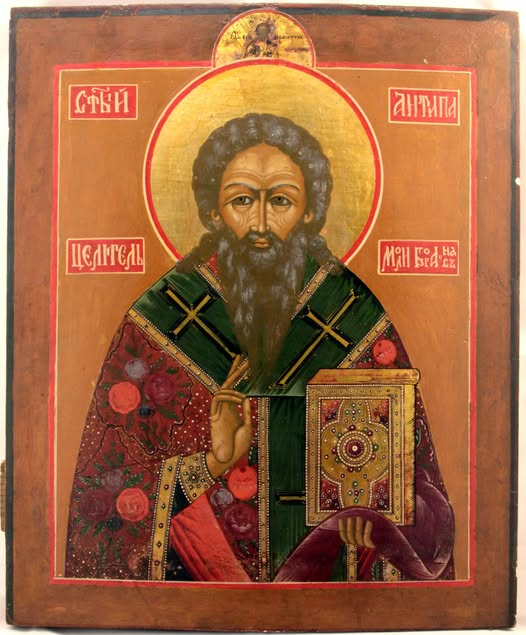The Life of Saint Antipas, Bishop of Pergamum and Hieromartyr (Commemorated April 11/24) #
Saint Antipas, a hieromartyr, was a disciple of the holy Apostle John the Theologian and served as bishop of the Church of Pergamum during the reign of Emperor Nero (54–68 A.D.).

At that time, by imperial decree, all who refused to offer sacrifices to idols were subjected to execution or exile. It was in this period that the holy Apostle John the Theologian was exiled to the island of Patmos in the Aegean Sea, where the Lord revealed to him the future fate of the world and of the Holy Church.
It is in the Book of Revelation that we hear the words addressed to the bishop of Pergamum:
“And to the angel of the Church in Pergamum write: These things saith He which hath the sharp sword with two edges: I know thy works, and where thou dwellest, even where Satan’s seat is: and thou holdest fast My name, and hast not denied My faith, even in those days wherein Antipas was My faithful martyr, who was slain among you, where Satan dwelleth” (Revelation 2:12–13).
By his example, his unwavering faith, and his tireless preaching of Christ, Saint Antipas moved many of the inhabitants of Pergamum to abandon sacrifices to idols. The pagan priests accused the bishop of leading the people away from worshipping the ancestral gods and demanded that he cease preaching Christ and offer sacrifice to the idols.
Saint Antipas calmly replied that he would not serve the demon-gods, who flee even from him, a mortal man. He worships and will always worship the Lord Almighty, the Creator of all things, His Only-Begotten and Consubstantial Son, and the Holy Spirit.
The priests retorted that their gods had existed from ancient times, while Christ appeared only recently and was crucified under Pilate as a criminal. But the saint boldly responded that the pagan gods were fashioned by human hands and that all the tales about them were filled with lawlessness and vice. He steadfastly confessed his faith in the Son of God, who was incarnate of the Most Holy Virgin.
Enraged, the pagan priests dragged the hieromartyr Antipas into the temple of Artemis and cast him into a red-hot bronze bull—an idol used for burning offerings. Within that fiery furnace, the saint prayed aloud, entreating God to receive his soul and to strengthen the faith of the Christians. He departed unto the Lord peacefully, as though falling asleep († ca. 68 A.D.).
By night, the Christians of Pergamum took the saint’s body—untouched by the flames—and buried him with honor. His tomb became a source of miracles and healing from many ailments. In particular, the faithful seek the intercessions of the holy hieromartyr Antipas for relief from toothaches.